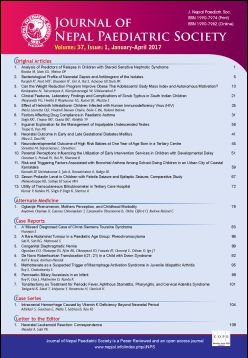Can the Weight Reduction Program Improve Obese Thai Adolescents’ Body Mass Index and Autonomous Motivation?
DOI:
https://doi.org/10.3126/jnps.v37i1.16938Keywords:
weight reduction program, self-determination theory, social cognitive theory, body mass index, autonomous motivationAbstract
Introduction: Overweight and obesity has impacted both the physiological and psychological health of children and adolescents. Evidence of cross-cultural studies has showed mixed results regarding weight reduction program (WRPs) based on self-determination theory (SDT) and social cognitive theory (SCT) affecting students with overweight and obesity. This study examined the effectiveness of a WRP on body mass index (BMI) and autonomous motivation in overweight and obese Thai adolescents.
Material and Methods: An experimental study with intervention and control groups was employed. Participants were 304 Thai obese 7th- to 12th-grade students, ranging in age from 12 to 19 years. The intervention group was assigned to a program based on SDT and SCT, consisting of (1) a 12-week weight control phase and (2) a 12-week follow-up phase. The control group was assigned to a general health education program. The data were collected via psychometric questionnaires and anthropometric data.
Results: There were no statistical differences in adjusted means of BMI and autonomous motivation of physical activity and dietary intake occurred among participants in the two groups. Compared to those in the control group, participants in the intervention group showed a 0.4 smaller increase in BMI and a 0.4 greater decrease in autonomous motivation of dietary intake.
Conclusion: The WRP based on SDT and SCT showed no apparent effectiveness in improving BMI or autonomous motivation among these participants. Future studies should incorporate program that effectively harmonize with core school teaching activities and schedules.
Downloads
Downloads
Additional Files
Published
How to Cite
Issue
Section
License
Authors who publish with this journal agree to the following terms:
Authors retain copyright and grant the journal right of first publication with the work simultaneously licensed under a Creative Commons Attribution License that allows others to share the work with an acknowledgement of the work's authorship and initial publication in this journal.
Authors are able to enter into separate, additional contractual arrangements for the non-exclusive distribution of the journal's published version of the work (e.g., post it to an institutional repository or publish it in a book), with an acknowledgement of its initial publication in this journal.
Authors are permitted and encouraged to post their work online (e.g., in institutional repositories or on their website) prior to and during the submission process, as it can lead to productive exchanges, as well as earlier and greater citation of published work (See The Effect of Open Access).



